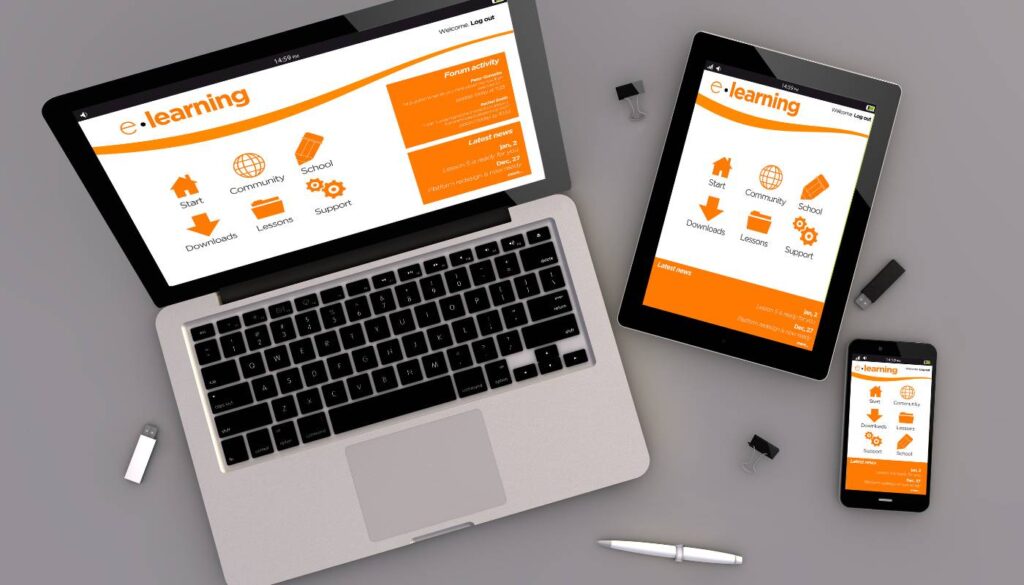It is essential to understand that e-learning platforms are those systems and software that are designed to deliver educational content and enable learning remotely. Through the years, e-learning platforms have gained wide acceptance among students, teachers, and organisations as a means of learning and training online. These platforms provide numerous features and opportunities that cannot be provided by traditional face-to-face education especially in terms of access, flexibility, and scalability. In this article, the author will explain what e-learning platforms are, their characteristics, the most popular platforms, the advantages of e-learning platforms, and the further development of e-learning.
What are E-Learning Platforms
E-learning platforms are also known as Virtual Learning Environment (VLE), Learning Management Systems (LMS), and Online Course Platforms which are web-based software systems which support remote teaching and learning. They serve as a platform through which the instructors can manage and assign content for learning, track performance, evaluate the students, and even communicate with them. Students login to e-learning systems to watch their multimedia courses, complete tests and quizzes, submit their assignments, post messages on forums and communicate with their teachers and other students. This makes learning to be possible from any computer or mobile device that is connected to the internet.
Key Features
Some of the standout features that the best e-learning platforms offer include: Some of the standout features that the best e-learning platforms offer include:
- Ease in authoring of the courses – These are features that enable anybody, even those with no technical background to design courses and sequences for the online course. This makes it easier to develop courses at a very fast rate.
- Communication tools – Live forums, instant messaging, messages and notices, and announcements help teachers and students to communicate and work together. This promotes active learning.
- Tests & Quizzes – whether in the form of quizzes, tests, exams, rubrics, peer and group assessments, among others, they help educators gauge the level of understanding among students. Automated grading also helps instructors and professors reduce their work load.
- Analytics and reporting – See course access information, engagement, completion rate and many other features. Understand where there is potential to capitalize on strengths, avoid weaknesses, or look for ways to enhance the situation.
- Mobile readiness – Application or responsive design enable the use of the tools on smartphones and tablet computers while in transit. This enhances the access and versatility.
Top E-Learning Platforms
Some of the most widely used and full-featured e-learning platforms today include:Some of the most widely used and full-featured e-learning platforms today include:
– Canvas – Highly acclaimed commercial virtual learning environment commonly implemented in schools and universities. It provides a simple UI, iOS/Android apps, analytics, assessments and course authoring tools.
– Blackboard – Another LMS that is focused on the educational niche. Some of the services include communication tools, content management, as well as course development tools.
– Moodle – A learning management system that is developed as an open-source solution and used globally by both large enterprises and universities. High modular architecture with superior communication interfaces can be further configured as needed.
– Udemy – Provides classes for more than 183,000 courses in various fields of study. Depends on content that is created by domain specialists. Most suitable for those who are wanting to enhance their careers and continue learning.
Benefits
There are many tangible benefits to utilizing e-learning platforms over traditional classroom-based instruction, such as:There are many tangible benefits to utilizing e-learning platforms over traditional classroom-based instruction, such as:
– Flexibility – It is available online and can be accessed anytime close to a computer or internet connection. There is no need to go to one specific place to access a class physically.
– Savings – This does away with the costs including tuition fees, accommodation, books, transport etc offered by the campus. Scales economically.
– Accessibility – Students can learn at their own convenience due to the self-paced nature of the program. Availability of learning materials online makes learning flexible – it can be done at any time during the day or night.
– Accessibility – Extends to hard-to-reach regions with no adequate educational facilities or infrastructure for learners with disabilities.
– Enhanced results – Lends itself to enhancing information retention as compared to traditional lectures. Offers data information for improvement of the curriculum in the future.
The Future
Several years, the market of e-learning is expected to grow at a very fast pace, especially given the fact that remote education is on an upward trend. In the future, due to development of technology, you should see e-learning platforms to include more content types, individualization, AI integration, virtual reality support, and better analytics. Technology will probably continue to be integrated into learning environments, particularly in the form of e-learning platforms.
Conclusion
Conclusively, it is evident that e-learning platforms have emerged as effective online environments for authors to create and deploy rich multimedia courses to learners around the world. They equip students with the freedom and convenience to acquire any knowledge they need, at any time of their choice, and with ease. What these platforms have been witnessing is continuous innovation and therefore they will define the future remote education for learners at all levels in the future years. Such opportunities’ capacity to operate beyond geographic limitations and physical infrastructure make e-learning platforms an exciting revolution in the process of teaching and learning that disrupt the conventional paradigm.
Seeking more informative articles? Business Vision Magazine is your go-to source.






